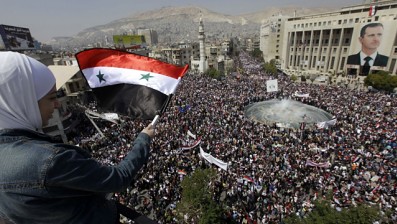
Large demonstrations in support of the Syrian government of President Bashar Al-Assad in Damascus, the capital, on March 29, 2011. The president addressed parliament on March 30 and denounced the foreign plot against the country., a photo by Pan-African News Wire File Photos on Flickr.
Syria Sets Conditions on Withdrawing Troops
By MARIA ABI-HABIB
Wall Street Journal
BEIRUT—Syria's Foreign Ministry said Sunday it won't withdraw troops from civilian areas unless all rebel groups provide written guarantees they will lay down their weapons, a further blow to efforts to arrange a cease-fire and implement a peace plan backed by the United Nations.
Syria's Foreign Ministry spokesman, Jihad Makdessi, said the U.N. was failing to hold the opposition to account in the peace deal.
Syria's commitment to the plan was misinterpreted and government forces won't start pulling out of population centers without the written guarantees, Mr. Makdessi added.
Observers said that divisions within the opposition will make it hard to secure the guarantees requested by the government.
Many rebel groups are homegrown, with no command and control, making it nearly impossible to implement an across-the-board commitment to lay down arms.
Riad al Assad, the commander of the Free Syrian Army, the largest armed opposition group, said he supports the U.N. plan but won't provide written guarantees to lay down arms.
"We won't lay down our arms. The regime lies. Each day they say something and do something else," Mr. Assad said Sunday. "More than 1,000 have died in these last two weeks. Each day the government brings their tanks and arrests the people."
The opposition is also deeply suspicious of President Bashar al Assad's promises to work toward a cease-fire, pointing to peace deals the government violated in the past.
"Why are we going to commit to disarm when Assad continues to kill our children, despite his [broken] promises?" demanded an opposition member in Homs, speaking over Skype.
The Syrian Foreign Ministry statement backtracks on previous public commitments given by the government that it will fully abide by the U.N. six-point plan, which paves the way for a cease-fire, due to be implemented by Tuesday.
The U.N. and Arab League appointed former U.N. Secretary General Kofi Annan as the special envoy to broker the peace deal.
"Annan has not offered written guarantees to the Syrian government that the armed groups agreed to stop violence, nor has he offered guarantees that Qatar, Saudi Arabia and Turkey will commit to stop funding and arming terrorist groups," said Syrian state news agency Sana, paraphrasing Mr. Makdessi's comments.
Syria accuses Saudi Arabia, Qatar and Turkey of arming the opposition.
Mr. Annan's spokesman, Ahmad Fawaz, declined to comment on the Foreign Ministry's new conditions.
Nearly 130 civilians were killed across Syria on Saturday and an additional 34 were killed by Sunday afternoon local time, according to the Local Coordination Committee, an activist group.
"I am shocked by reports of a surge of violence and atrocities in several towns and villages in Syria, resulting in alarming levels of casualties, refugees and displaced persons, in violation of assurances given to me," Mr. Annan said in an emailed statement Sunday.
"As we get closer to the Tuesday 10 April deadline, I remind the Syrian government of the need for full implementation of its commitments and stress that the present escalation of violence is unacceptable."
Separately, Pope Benedict XVI on Sunday implored the Syrian regime to heed international demands. "Particularly in Syria, may there be an end to bloodshed and an immediate commitment to the path of respect, dialogue and reconciliation, as called for by the international community," Pope Benedict said, making Syria the first of several strife-torn countries he mentioned in his traditional "Urbi et Orbi" (Latin for "to the city and to the world") Easter speech.
Write to Maria Abi-Habib at maria.habib@dowjones.com
No comments:
Post a Comment